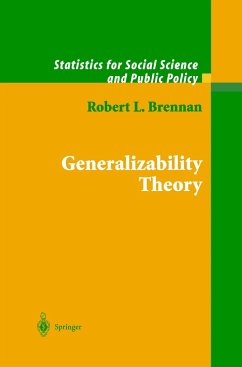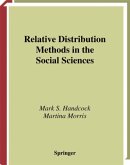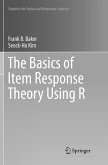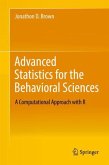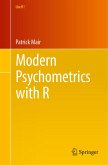In 1972 a monograph by Cronbach, Gleser, Nanda, and Rajaratnam was published entitled The Dependability of Behavioral Measurements. That book incorporated, systematized, and extended their previous research into what came to be called generalizability theory, which liberalizes classical test theory, in part through the application of analysis of variance proce dures that focus on variance components. Generalizability theory is perhaps the most broadly defined measurement model currently in existence, and the Cronbach et al. (1972) treatment of the theory represents a major con tribution to psychometrics. However, as Cronbach et al. (1972, p. 3) state, their book is "complexly organized and by no means simple to follow" and, of course, it is nearly 30 years old. In 1983, ACT, Inc. published my monograph entitled Elements of Gen eralizability Theory, with a slightly revised version appearing in 1992. That treatment is considerably less comprehensive than Cronbach et al. (1972) but still detailed enough to convey much ofthe richness of the theory and to facilitate its application. However, the 1983/1992 monograph is essen tially two decades old, it does not cover multivariate generalizability theory in depth, and it does not incorporate recent developments in statistics that bear upon the estimation of variance components. Also, of course, there have been numerous developments in generalizability theory in the last 20 years.
From the reviews:
The book provides a comprehensive and up-to-date treatment of generalizability theory. It provides a synthesis of those parts of the statistical literature that are directly applicable to generalizability theory." Mathematical Reviews "...This book belongs in every measurement specialist's reference collection, as a resource to which to turn for insight into virtually any question about GT, whether it deals with univariate or multivariate applications. There is simply nowhere else to get such a comprehensive presentation of the theory." Psychometrika "This book fills a need for up-to-date presentation, critical review, and analysis of issues in generalizability theory, particularly in multivariate generalizability theory. Brennan has for many years been at the forefront of research and development in generalizability theory and he provides a well-written, thoughtful, focused analysis of recent issues. I would highly recommend this book to anyone seriously interested in learning about generalizability theory. It is an excellent resource for anyone wanting to use generalizability theory in research ... ."
(Laura L. B. Barnes, Journal of Education Measurement, 2002)
The book provides a comprehensive and up-to-date treatment of generalizability theory. It provides a synthesis of those parts of the statistical literature that are directly applicable to generalizability theory." Mathematical Reviews "...This book belongs in every measurement specialist's reference collection, as a resource to which to turn for insight into virtually any question about GT, whether it deals with univariate or multivariate applications. There is simply nowhere else to get such a comprehensive presentation of the theory." Psychometrika "This book fills a need for up-to-date presentation, critical review, and analysis of issues in generalizability theory, particularly in multivariate generalizability theory. Brennan has for many years been at the forefront of research and development in generalizability theory and he provides a well-written, thoughtful, focused analysis of recent issues. I would highly recommend this book to anyone seriously interested in learning about generalizability theory. It is an excellent resource for anyone wanting to use generalizability theory in research ... ."
(Laura L. B. Barnes, Journal of Education Measurement, 2002)

